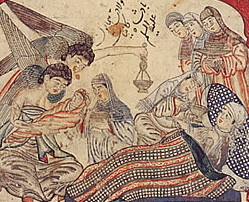 |
Birth
of the prophet Muhammad (detail) Iranian ms, c. 1314–15 CE |
The prophet Muhammad—the man that was to reform belief and religious practice in Arabia and sow the seeds for a cultural explosion—was born in 569 CE. His father had died before he was born, and several years later he lost his mother and grandfather. At the age of eight he was left in the care of his uncle, Abu-Talib, and as a child he served as a shepherd boy. Not much else is known about his early years, but by the time he was 25 and living in Mekkah his integrity was well known.
A wealthy widow, Khadijah, employed him to manage her caravan and eventually they married. He learned much during his travels and acquired a reputation for honesty. He also became a member of an organisation set up to aid the oppressed. Popularly known as al-Amin, ‘the honest’, he often served as an arbiter in disputes.
Around the age of 35 Muhammad became absorbed in spiritual meditations, spending the entire month of Ramadan in retreat in a cave in Jabal-an-Nur (‘mountain of light’); here he would pray and meditate, sharing what provisions he had with passersby. It was in his 40th year that he experienced the presence of the angel Gabriel, and received the news that Allah had chosen him as his messenger:
Read, in the name of your Lord,
Who created man from an embryo.
Read, your Lord most exalted
Teaches by means of the pen.
He teaches [humans] what [they] never knew. (Qu’ran 96: 1-5)
Three years passed during which Muhammad deeped his meditation and developed the spiritual practices—the ablutions and prostrations—that the angel had taught him in the initial encounter. He subsequently received the revelations that form the book known as the Qu’ran, ‘recitation’. He also began to preach publicly in Mekkah. Many were receptive to this new message, but because of opposition from others and threats of bodily harm, Muhammad and his followers were forced to flee to the oasis town of Yathrib in 622 CE. This journey, known as al-Hijra, marks the beginning of the Muslim era; Yathrib later became known as al-Madinah, ‘city of the prophet’.
Mawlid al-Nabi—the celebration of the Prophet’s birth—is observed on the 12th day of the month of Rabi al-Awwal in the Muslim calendar. Festivities include sermons, recitation of litanies, honouring of religious dignitaries, gift giving, and a feast. The festival is observed throughout the Muslim world, although some conservative sects consider it idolatrous in that if focusses on the human prophet, rather than Allah.
For more, see the feature article Trouble in the beginning.